|
|
|
Sort Order |
|
|
|
Items / Page
|
|
|
|
|
|
|
| Srl | Item |
| 1 |
ID:
132052
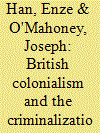

|
|
|
|
|
| Publication |
2014.
|
| Summary/Abstract |
What explains the global variation in laws criminalizing homosexual conduct? Recent research has claimed that British colonialism is largely responsible for the criminalization of homosexuality around the world. This article utilizes a newly constructed dataset that includes up-to-date data on 185 countries to assess this claim. We find that British colonies are much more likely to have criminalization of homosexual conduct laws than other colonies or other states in general. This result holds after controlling for other variables that might be expected to influence the likelihood of repressive lesbian, gay, bisexual and transgender (LGBT) rights legislation. However, we also find that the evidence in favour of the claim that British imperialism 'poisoned' societies against homosexuality is weak. British colonies do not systematically take longer to decriminalize homosexual conduct than other European colonies.
|
|
|
|
|
|
|
|
|
|
|
|
|
|
|
|
| 2 |
ID:
087179
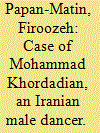

|
|
|
|
|
| Publication |
2009.
|
| Summary/Abstract |
In his speech at Columbia University, President Mahmud Ahmadinejad stated that there are no homosexuals in Iran. His attempt was to avoid the subject and any ensuing controversies that could hamper the nuclear talks at the United Nations General Assembly the following day. The present study will argue that the denial of homosexuality has been selectively applied to situations when the most prudent alternative was to overlook the issue or to keep quiet about it. A few years earlier, while the former president, Mohammad Khatami, was still in office, this attitude determined the course of action in dealing with Mohammad Khordadian, a famous Los Angeles based Iranian-American male cabaret dancer who was also rumored to be gay. In the spring of 2002, Khordadian visited Iran for the first time in more than twenty years. The authorities considered it an offense that he dared to challenge the morality codes of the Islamic Republic by crossing the border into Iran without any apprehension. The imprisonment and trial of Khordadian is a unique case in focus.
|
|
|
|
|
|
|
|
|
|
|
|
|
|
|
|
| 3 |
ID:
097181
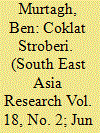

|
|
|
|
|
| Publication |
2010.
|
| Summary/Abstract |
This article focuses on the 2007 Indonesian film Coklat Stroberi and its accompanying novel and pop video. The novel by Christian Simamora was based on the film script. The song 'Di sini untukmu' was written especially for the film, in which the band Ungu made a cameo appearance, and the accompanying pop video features numerous scenes from it. While in recent years quite a number of Indonesian films have featured gay characters, this film is notable for the fact that it puts a gay relationship at the very centre of a romantic comedy, and is clearly aimed at a young (17-25) audience. Coklat Stroberi is undoubtedly trying to show same-sex relationships in a progressive light. Nonetheless, the representation of the characters and the film's final outcome highlight an ambivalent attitude towards homosexuality that is common in many Indonesian films. This article pays particular attention to those ambivalences and explores how our understanding of them is enhanced by analysing the transformation of the film into the genres of novel and pop video. Attention is also paid to an apparent mismatch in the filmic imagination of gay characters and the reality of gay lives as they are lived in Indonesia today.
|
|
|
|
|
|
|
|
|
|
|
|
|
|
|
|
| 4 |
ID:
172337
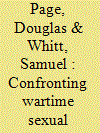

|
|
|
|
|
| Summary/Abstract |
Existing research on conflict-related sexual violence focuses on the motivations of perpetrators and effects on survivors. What remains less clear is how postconflict societies respond to the hardships survivors face. In survey experiments in Bosnia, we examine public support for financial aid, legal aid, and public recognition for survivors. First, we find a persistent ethnocentric view of sexual violence, where respondents are less supportive when the perpetrator is identified as co-ethnic and survivors are perceived as out-groups. Second, respondents are less supportive of male survivors than female survivors, which we attribute to social stigmas surrounding same-gender sexual activity. Consistent with our argument, those who are intolerant of homosexuality are especially averse to providing aid to male survivors. This study points to the long-term challenges survivors face due to ethnic divisions and social stigmatization from sexual violence.
|
|
|
|
|
|
|
|
|
|
|
|
|
|
|
|
| 5 |
ID:
087291
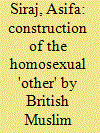

|
|
|
|
|
| Publication |
2009.
|
| Summary/Abstract |
Islam's explicit condemnation of homosexuality has created a theologically based homophobia which engenders the intolerance of homosexuals by Muslims. In this article I explore Muslim attitudes towards homosexuality and homosexuals as this area has elicited very little research. Based on structured interviews with 68 Muslim male and female heterosexuals I examine the connection between participants' attitudes towards homosexuality and their understanding of gender and gender roles. I also analyse whether participants' views are shaped by their religious beliefs and values. Age, gender, education and level of religiosity are analysed to see whether they affect attitudes. Data suggest that participants held negative attitudes towards homosexuals and this is the result of being religiously conservative in their attitudes towards homosexuality and gender roles.
|
|
|
|
|
|
|
|
|
|
|
|
|
|
|
|
| 6 |
ID:
185366
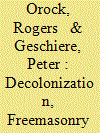

|
|
|
|
|
| Summary/Abstract |
Relating to academic debates on the emergence of moral panics over homosexuality in several parts of Africa, this article examines rumours on homosexuality as a political issue that connects colonial pasts and postcolonial struggles in Cameroon. We link current struggles over homosexuality to broader debates about the question of Cameroon’s decolonization from France. The article focuses on the figure of Dr Louis Paul Aujoulat, a French colonial official in Cameroon who played a crucial role in the country’s decolonization in the 1950s. Aujoulat died in 1972, but recently, he made a ‘return’ in rumours and public debates in a new role: he is now accused of having ‘sodomized’ the emergent new elite of Cameroon, thus introducing homosexuality; moreover, he is linked to Freemasonry and occult initiation rites. Our aim was to show how a particular decolonization trajectory—very rocky in the case of Cameroon—is related to the present-day moral panic about a supposed proliferation of homosexuality. Freemasonry and its special history on the African continent—notably its role in maintaining the coherence of Françafrique between France and its former colonies—is a severely understudied topic. Its linkages to same-sex practices and illicit enrichment give the Cameroonian case a wider relevance. We argue that the new rumours on Dr Aujoulat define him as a key figure in linking Freemasonry, homosexuality and illicit enrichment to present-day issues of state governance, citizenship and elite misrule in Cameroon.
|
|
|
|
|
|
|
|
|
|
|
|
|
|
|
|
| 7 |
ID:
197588


|
|
|
|
|
| Summary/Abstract |
In recent years, dozens of families in Palestine have publicly disowned male relatives who have transgressed social or sexual norms in some way. In this article, we contend that such acts of disowning are, for Palestinian families, a means of protection from public shaming. We contrast the discourse of disowning transgressive males with the ‘honour killing’ of transgressive females. Disownment is almost never an option for female relatives who commit similar transgressions. By severing contact with male relatives who have violated hegemonic ideals of loyalty to one’s nation, self-control, and sacrifice, families can deflect accusations of complicity. The hegemony of these ideals is maintained by punishing those who ally themselves with the Israeli occupation, are homosexuals, or are seen as ‘transgressive’ women. The article demonstrates that familial relations can be regarded as discontinuous: biological ties can be severed both linguistically and physically. The discourse of disowning, which, to the best of our knowledge, has not been scrutinised in contemporary Palestine will be analysed within the interrelated webs of traditions, religion, and politics.
|
|
|
|
|
|
|
|
|
|
|
|
|
|
|
|
| 8 |
ID:
184579
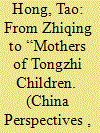

|
|
|
|
|
| Summary/Abstract |
This paper mobilises interactionist sociology to explore the biographies and moral careers of two former zhiqing who emerged, circa 2007, as well-known mother figures in a dynamic tongzhi blogosphere. Their encounter with young tongzhi inaugurated parental advocacy for their sexually nonconforming children in China. By anchoring tongzhi activism in contemporary Chinese history and reconstructing two parallel processes of activist-becoming, this paper seeks to better understand how political agency emerged in an authoritarian setting while making a case for studying activism as historicised meaning-making activities.
|
|
|
|
|
|
|
|
|
|
|
|
|
|
|
|
| 9 |
ID:
094174
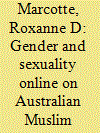

|
|
|
| 10 |
ID:
131098
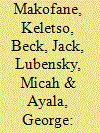

|
|
|
|
|
| Publication |
2014.
|
| Summary/Abstract |
Despite sustained opposition, legislation criminalising homosexuality persists and threatens human security in Africa in numerous ways. This paper explores the circumstances around the enactment of new anti-homosexual legislation in Nigeria and Uganda, examining five categories of insecurity faced by lesbian, gay, bisexual, and transgender (LGBT) people in the context of these laws: physical violence; extortion and blackmail; arbitrary arrest and detention; displacement from home; and loss of work.
|
|
|
|
|
|
|
|
|
|
|
|
|
|
|
|
| 11 |
ID:
189507
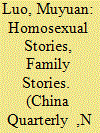

|
|
|
|
|
| Summary/Abstract |
This article investigates the recent proliferation of family-themed homosexual stories in China based on life-history interviews and participant observation conducted in Shenzhen. We develop the concept of “neo-Confucian homonormativity” – characterized by a harmonious relationship between gay men and their families of origin and their ability and aspiration to enter a monogamous relationship and become parents – to explain the production, circulation and consumption of these stories in the Chinese gay community. We argue that these stories are socially embedded actions enabled by the emerging neoliberal sexual politics in the Chinese gay community that influence the organization of the Chinese gay community and Chinese gay men's lived experiences. By analysing the emerging storytelling practices in the Chinese gay community, this article challenges the Western-centric way of theorizing homonormativity and opens up the possibility to conceptualize homonormativity from an Asian perspective.
|
|
|
|
|
|
|
|
|
|
|
|
|
|
|
|
| 12 |
ID:
125949
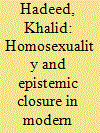

|
|
|
|
|
| Publication |
2013.
|
| Summary/Abstract |
In this paper I argue that representations of homosexuality in modern Arabic literature have tended to isolate it and contain its threat through a conceptual strai(gh)tjacket that I term "epistemic closure." I begin by analyzing Sa?d Allah Wannus's play Tuqus al-Isharat wa-l-Tahawwulat as an essentialist paradigm of closure, where a language of interiority and essence identifies male homosexuality with passivity and femininity, subordinated a priori to a sexually and socially dominant masculinity. Then, I examine ?Ala? al-Aswani's novel ?Imarat Ya?qubyan as a constructionist example of the same closure, in which homosexuality is explained through a narrative of abnormal development that circumscribes its diffuse potential. Finally, I read Huda Barakat's Sayyidi wa-Habibi as a "queer" novel that links homosexuality to the continuum of male homosocial desire, thereby disrupting the normative distribution of center and margin and suggesting a way out of the epistemic closure imposed on homosexuality.
|
|
|
|
|
|
|
|
|
|
|
|
|
|
|
|
| 13 |
ID:
124511
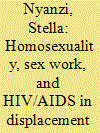

|
|
|
|
|
| Publication |
2013.
|
| Summary/Abstract |
This article aims to disrupt the silence, invisibility and erasures of non-heteronormative sexual orientations or gender identities, and of sex work, in HIV/AIDS responses within displacement and post-conflict settings in Africa. Informed by Gayle Rubin's sexual hierarchy theoretical framework,1 it explores the role of discrimination and violation of the rights of sex workers and of gender and sexual minorities in driving the HIV/AIDS epidemic during displacement. Specific case materials focus on ethnographic research conducted in urban and rural Uganda. Recommendations for policy, practice and programmes are outlined.
|
|
|
|
|
|
|
|
|
|
|
|
|
|
|
|
| 14 |
ID:
125957
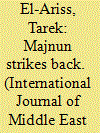

|
|
|
|
|
| Publication |
2013.
|
| Summary/Abstract |
This article examines the association of homosexuality with madness in two contemporary novels, Hanan al-Shaykh's Innaha London ya ?Azizi (Only in London) and Hamdi Abu Golayyel's (Julayyil) Lusus Mutaqa?idun (Thieves in Retirement). Through a comparative reading of the figure of Majnun, an impassioned lover and mad rebel, I argue that literary articulations of queer desire operate as embodied resistance to social and political normativity, both in the Arab world and in the diaspora. Discussing the aesthetic transformation of the contemporary novel and drawing on the Arab-Islamic literary and philosophical tradition, I critically engage Michel Foucault's reading of sexual and epistemological developments in light of current debates about Arab homosexuality. I show how discursive models of sexuality are situated in modernity's intertwinement with other structures of power and systems of belief, crossing cultural contexts and linguistic registers.
|
|
|
|
|
|
|
|
|
|
|
|
|
|
|
|
| 15 |
ID:
111610
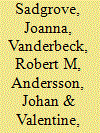

|
|
|
|
|
| Publication |
2012.
|
| Summary/Abstract |
Since the drafting of Uganda's anti-homosexuality bill in 2009, considerable attention has been paid both in Uganda and across the African continent to the political and social significance of homosexual behaviour and identity. However, current debates have not adequately explained how and why anti-homosexual rhetoric has been able to gain such popular purchase within Uganda. In order to move beyond reductive representations of an innate African homophobia, we argue that it is necessary to recognise the deep imbrication of sexuality, family life, procreation and material exchange in Uganda, as well as the ways in which elite actors (including government officials, the media and religious leaders) are able to manipulate social anxieties to further particular ends. We employ a discourse analysis of reporting in the state-owned newspaper New Vision, first considering how the issue of homosexuality has been represented in relation to wider discourses regarding threats to public morality and national sovereignty. Then, through fieldwork undertaken in Uganda in 2009, we explore three key themes that offer deeper insights into the seeming resonance of this popular rhetoric about homosexuality: constructions of the family, the nature of societal morality, and understandings about reciprocity and material exchange in contemporary Ugandan society.
|
|
|
|
|
|
|
|
|
|
|
|
|
|
|
|
| 16 |
ID:
113179
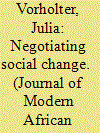

|
|
|
|
|
| Publication |
2012.
|
| Summary/Abstract |
A common claim, in public discourses and in post-colonial theory, is that colonialism, and more recently the aid industry and the media, have created global hegemonic norms, which have been enforced on non-Western societies. While this may be true in some respects, this article takes a different stance on the debate. It scrutinises perceptions of Western-influenced social change in Uganda, and differentiates between discourses on Westernisation and discourses on neo-colonialism. Both are analysed as forms of social critique - one internally and the other externally oriented. The largely elitist discourse on neo-colonialism is explicitly critical of the West and its interventions in Uganda. But it is not representative of the more ambiguous perceptions of Westernisation among 'ordinary' people, who use references to the West to comment on contemporary Ugandan society. The article is based on empirical research in Northern Uganda. It focuses on discourses on gender, kinship and sexuality, and the recent debate on homosexuality.
|
|
|
|
|
|
|
|
|
|
|
|
|
|
|
|
| 17 |
ID:
088915
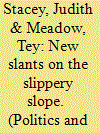

|
|
|
|
|
| Publication |
2009.
|
| Summary/Abstract |
This article investigates the often cited and dismissed, but rarely examined, relationship between legalizing same-sex marriage and polygamy. Employing a comparative historical analysis of U.S. and South African jurisprudence, ideology, and cultural politics, we examine efforts to expand, restrict, and regulate the gender and number of legally recognized conjugal bonds. South African family jurisprudence grants legal recognition to both same-sex marriage and polygyny, while the United States prohibits and resists both. However, social and material conditions make it easier to practice family diversity in the U.S. than in South Africa. Our analysis of the very different histories of polygamy and same-sex marriage in the two societies suggests the centrality of racial politics to marriage regimes, yielding paradoxical narratives about the implications of legal same-sex marriage for the future of polygamy and sexual democracy. If there is a slippery marital slope, we argue, it does not tilt in a singular or expected direction.
|
|
|
|
|
|
|
|
|
|
|
|
|
|
|
|
| 18 |
ID:
087294
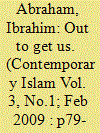

|
|
|
|
|
| Publication |
2009.
|
| Summary/Abstract |
Drawing on qualitative data from interviews with twelve queer Muslims in Australia, this article analyses the ongoing struggle for queer Muslim recognition within the context of the so-called 'Clash of Civilisations'. Analysing the rhetoric of national security and 'Western' civilisational identity, this article interrogates the incorporation of sexuality into the cultural and political discourse of the 'war on terror', from the xenophobic demonisation of Muslims as sexual predators, to liberal Islamophobia that posits Islam as an aggressive and alien Other against which liberal capitalism must be defended. Within this hostile environment, queer Muslims in Australia are articulating various strategies for finding meaning in their lives. From a Marxist perspective, this article analyses these strategies for recognition which range from complex acts of 'closeting' sexual, ethnic and religious identities, to subversive acts of critical hybridity that seek to negate the exclusionary nature of homophobia and Islamophobia within Australia's multicultural society.
|
|
|
|
|
|
|
|
|
|
|
|
|
|
|
|
| 19 |
ID:
189559
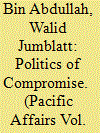

|
|
|
|
|
| Summary/Abstract |
This article discusses the repeal of Singapore’s Section 377A, the anti-gay sex law, which was announced by Prime Minister (PM) Lee Hsien Loong during the 2022 National Day Rally. I contend that the declaration by PM Lee demonstrates the possibilities and limits of advocacy coalition-building in Singapore. Utilizing the concept of calibrated social liberalization, I postulate that the repeal of Section 377A was the government’s response to shifting societal attitudes and years of strategic and adroit advocacy coalitionbuilding. However, predicated upon this success is that LGBT issues are not critical to the People’s Action Party’s (PAP) legitimacy, which is why it is willing to allow for contestations in this sphere. The PAP engages in social liberalization, without significant political liberalization; even then, the cultural liberalization is not absolute, as the government attempts to strike a political-electoral compromise with conservatives. Ultimately, calibrated social liberalization occurs in areas where there is significant public support, and on issues regarding which the government has no clear ideological predispositions.
|
|
|
|
|
|
|
|
|
|
|
|
|
|
|
|
| 20 |
ID:
090586
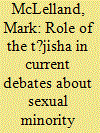

|
|
|
|
|
| Publication |
2009.
|
| Summary/Abstract |
This paper considers two unforeseen outcomes of the primacy of the t?jisha in current LGBTQ discourse. Firstly, through insisting on attending to the voice of each individual, it has proven difficult to establish common links among discriminated communities (or within communities) because of widely diverging perspectives. Also, given the broad variety in many individuals' experience of non-normative sexuality, having to identify and speak as a t?jisha has engendered normalizing effects. The current primacy of the t?jisha reinforces developmental narratives of sexual-identity formation (only the 'out' homosexual is truly authentic) and in so doing inadvertently silences those unable or unwilling to prioritize the sexual in their presentation of self, or whose modes of self-expression fall outside current orthodoxies that provide the boundaries for sexual-minority identification.
|
|
|
|
|
|
|
|
|
|
|
|
|
|
|
|
|
|
|
|
|